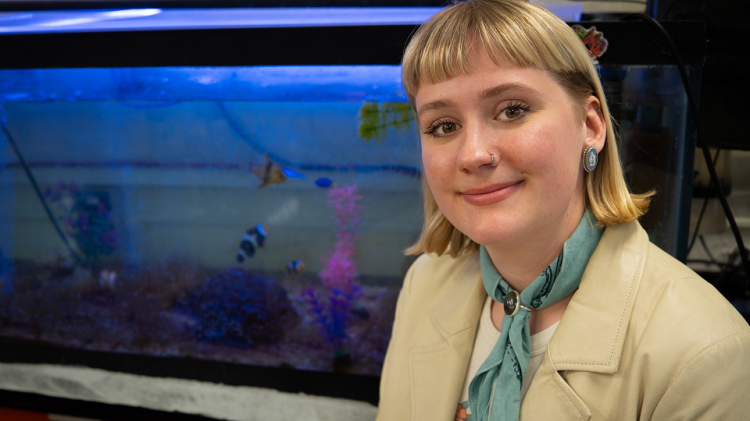For weeks, Lexy Reinhardt, a StFX biology master's student from Hamilton, ON, dove into the waters off the Bamfield Marine Sciences Centre on Vancouver Island where the rain forest meets the ocean taking videos of the sea slug, Hermissenda crassicornis in its natural habitat. She spent the next four months back at StFX watching hundreds of hours of video to track their behaviour and movement.
Now, her work on sea slug field behavior and navigation has earned national recognition. At the Canadian Society of Zoologists annual meeting held this month at Wilfred Laurier University, Ms. Reinhardt won the Cas C. Lindsey Prize for best student presentation or poster in the fields of behaviour, ecology or evolution. She presented the first analyses of her MSc project: A first look at gastropod navigation in complex wave affected environments.
Recent StFX graduate Victoria Tweedie-Pitre also did a great job, presenting her honours thesis work on snail neuroanatomy at the conference, the sole undergraduate competitor for the Hall Award for best student presentation in the disciplines of comparative morphology, development and biomechanics.

Lexy Reinhardt
ESPECIALLY IMPRESSIVE
"Winning the prize is especially impressive from Lexy since this was her first presentation at a scientific conference. The annual meeting for the Canadian Society of Zoologists is our national conference for many different fields of animal science. The conference is very student focused, which means it's both a great venue to do your first presentation, but also involves some stiff competition for the student awards," says StFX biology professor and supervisor Dr. Russell Wyeth.
"Competitors for the CAS Lindsay Prize included any students working on ecology, evolution or behaviour, giving either a poster or a talk. So, coming out on top is really impressive."
Dr. Wyeth says Ms. Reinhardt's research studying nudibranch navigation involved several challenges, all of which she met.
"We had a very short five weeks to get all the data, with substantial logistical preparation required to travel to Bamfield Marine Sciences Centre on the west coast, dealing with dive, video, and other equipment, a lot of which stayed underwater for the full five weeks, and very little margin for error, and Lexy was on top of it all."
Since then, the challenge has been to persevere through analysis of hundreds of hours of video data.
"Again, she exceeded my expectations on progress there showing real dedication to the task. As part of that, she's developed her own customized software to do the sophisticated analyses required, making great use of the new AI tools that are becoming available."
MILESTONE MOMENT
Ms. Reinhardt says receiving the award was a special moment.
"I was really surprised. I was shaking. A lot of the other students were PhD students at larger universities. I was really happy with it."
Along with presenting her data, she worked to make her presentation engaging as she communicated the research findings with the audience. It all resonated with the judges, who told her how impressed they were.
Winning national honours was a poignant moment personally.
"For me, diagnosed with ADHD at a young age, a lot of people and teachers didn't think I'd really go far in life. This was a really big milestone in my life. I felt like I had finally gotten there," Ms. Reinhardt says. "I finally proved to people that I could do better than what was expected of me; that despite having this label, I wasn't different than anyone else," she says.
"I personally think my ADHD makes me an amazing scientist."
Ms. Reinhardt says because her brain works differently, she can approach problems differently than others. It is also what led her to be especially interested in research around the intersection between the brain and behaviour.
Ms. Reinhardt says her project sought to understand how organisms navigate in environments where they can't use visual clues to guide them.
Humans, she says, mainly use their vision to guide their navigation. But when you're in a different environment, like under water, where you can't see, you may need to use other senses like smell. Animals follow smells, but she says researchers don't know a lot about how they do it.
"We know they're not using vision," she says on the sea slugs she studies. They have really tiny eyes, which are under their skin and at the top of their brain.
Ms. Reinhardt says they expected the slugs would use smell and follow the flow of the water once they smelled a food source. This is not what they found.
"They're not going with the flow," she said.
"We think they're doing something more complex or way more simple."
The researchers are now trying to figure out what the sea slugs are doing.
Why sea slugs? "Studying small creatures can lead to answers to really big questions," she says, including on such topics as complex flow, the sensory system, sensory navigation, and animal navigation in general.
Ms. Reinhardt says the project was a perfect fit. She's always loved the ocean and learned to dive at age 10. She is also passionate about both understanding different brains and observing animals in their own environments.
After she completes her master's degree, Ms. Reinhardt plans to continue in academia, going on for a PhD, eventually with a goal to become a professor. She wants to stay involved in the field of neuroethology and she wants to continue working with marine invertebrates.
The Lindsay Prize is not her only recent honour. One of the photos Ms. Reinhardt took for her research was on the cover of a scientific journal and another is currently a finalist in NSERC's science exposed contest. The public is invited to vote in this contest.










